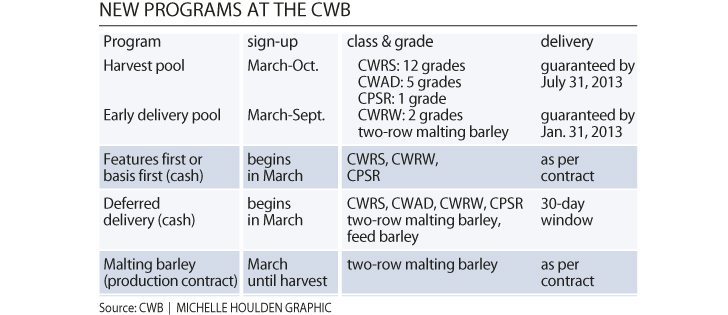Canadian Wheat Board officials have unveiled details farmers and the grain industry have been clamouring for.
Six contracts will be available from the CWB by the end of this month.
At the first of 21 producer meetings scheduled across Western Canada, CWB officials outlined details of two pool contracts, three cash contracts and a malting barley contract all available for sign-up by the end of March.
The harvest pool, with a sign-up deadline of October 2012, and the early delivery pool, with a September 2012 deadline, are available for 12 grades of Canada Western Red Spring, five grades of Canada Western Amber Durum, one grade of Canada Prairie Spring Red, two grades of Canada Western Red Winter and two-row malting barley.
Read Also

The Organization for Economic Co-operation and Development lauds Canada’s low farm subsidies, criticizes supply management
The Organization for Economic Co-operation and Development lauded Canada’s low farm subsidies, criticized supply management in its global survey of farm support programs.
The futures first and basis first cash contracts begin this month for CWRS, CWRW and CPSR.
There is also a deferred delivery cash contract for four wheat classes, two-row malting barley and feed barley, with a 30-day window.
A two-row malting barley production contract is available from March until harvest.
“It’s really like starting a new business in a lot of ways,” said CWB marketing vice-president Gord Flaten.
However, unlike most new businesses, the CWB starts with “relationship capital” with customers, marketing expertise, a strong capital base, a government guarantee on borrowings and guaranteed initial and final payments of price pools.
Changes in legislation should make it possible to adjust payments more quickly than in the past, Flaten said.
The two new pools will be first come, first served. There will be no series sign-ups and no contract calls.
Producers can sign up directly through the CWB or go to one of its agents.
As of March 6, Cargill was the CWB’s only grain-handling partner or agent on record, but Flaten said deals are in the works with other handlers.
“We are going to have agreements with other grain companies, and particularly for the pool contracts, our expectation is that all or certainly most of the companies will be offering these contracts.”
Producers who sign up for one of the pools through an agent grain handler have the option of committing delivery at that grain handler or waiting to decide on a handler later.
“Our contracts will not commit you to dealing with one company,” said Flaten.
New to the mix is an early delivery pool that will market grain from harvest through Jan. 31 and then issue final payments. Flaten said the CWB expects this pool to fill quickly.
However, producers will have to consider whether they think the average grain price for the year will be better than the price available between September and January.
Producers’ ability to deal on freight and handling charges with a grain company will also affect their decision to participate in the early delivery pool.
The harvest pool will be managed as pools have in the past, with a sign-up deadline at the end of October for guaranteed delivery by July 31, 2013.
Participants in both pools will have to indicate at sign-up what grade they would normally expect to deliver.
Flaten said the indication carries no commitment but will allow the CWB to plan its sales.
If the indicated grade doesn’t prove out, producers can switch the grade or back out of the deal at no cost if they inform the CWB before the deadline.
Producers can also switch to a cash contract before the deadline. Fees will be associated with that.
Flaten said the CWB pool contracts offer flexibility in grade, choice of grain handling company and timing of delivery.
The three cash contracts are futures first, basis first and deferred delivery.
Flaten said the CWB will handle feed barley, winter wheat and other smaller volume product through deferred delivery. Grades on that contract must be selected at sign-up.
Futures first and basis first are available for CWRS, CWRW and CPSR.
Producers at last week’s meeting in Lethbridge asked why grain handlers would offer a CWB cash contract when they are also cash buying.
“We are going to have some sales that that company doesn’t have, at certain periods of time,” said Flaten.
CWB cash contracts will provide price and delivery certainty and a wide range of grades and will price futures and basis separately, he added.
Futures first offers a range of delivery choices, and there are no brokerage fees to pay on either it or basis first.
















